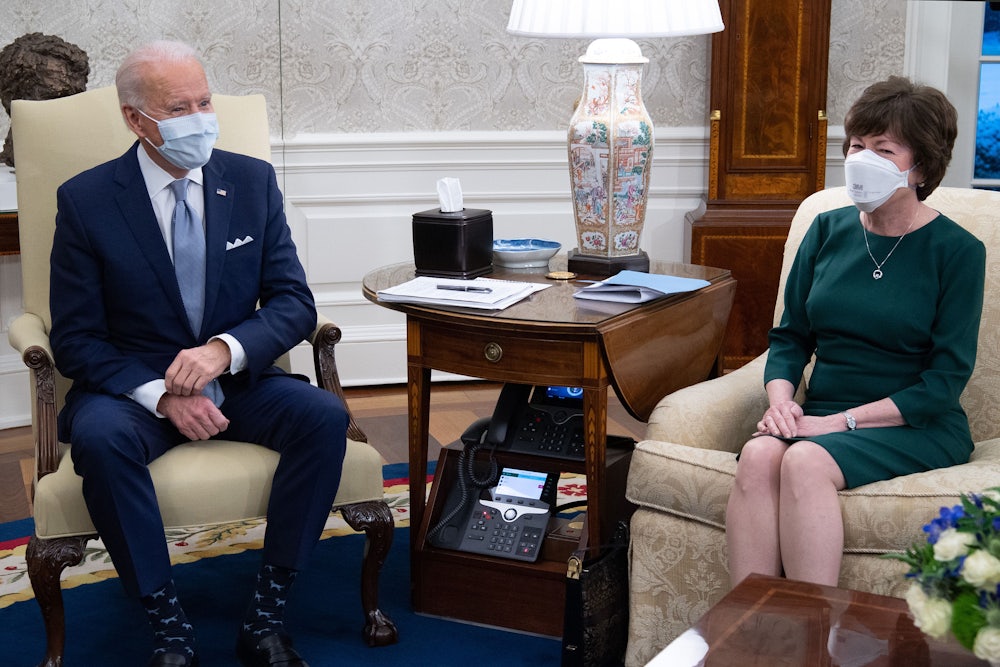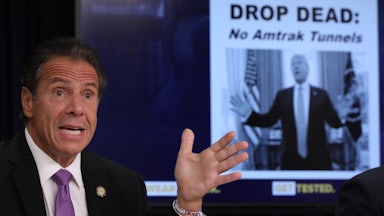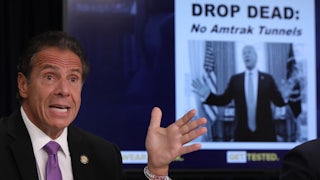The scene Monday night was not high on the list of Democratic fantasies about a Joe Biden presidency: A smiling Susan Collins, flanked by Republican Senate colleagues, stood in the icy White House driveway to announce, “We have just had a very productive, cordial two-hour meeting with the president and the vice president.”
“Productive and cordial” are not words that many on the left want to hear from Susan Collins, who was easily reelected to the Senate last year from Maine despite a $60 million Democratic campaign against her. But after proposing a Covid relief package less than one-third the size of Biden’s $1.9 trillion plan, Collins and nine other Senate Republicans were rewarded with the first congressional meeting with the new president.
As Collins offered her brief comments, it was easy to imagine that Biden had already hoisted the white flag on his economic stimulus in his commitment to bipartisanship. The Maine senator’s smile seemed to confirm every left-wing fear about Biden, the once and future moderate.
But 15 minutes later, White House press secretary Jen Psaki issued a statement on the Senate meeting that might in diplomatic circles be described as a “stiff note.” The White House release ended by paraphrasing Biden’s view that “he will not slow down work on this urgent crisis response, and will not settle for a package that fails to meet the moment.”
What’s going on here? Is Biden merely offering the atmospherics of bipartisanship while yielding nothing of substance to the Republicans? Or are cynical Republicans, who will never offer a workable compromise, simply playing Biden—as they did Barack Obama during the protracted 2009 health care negotiations?
At this early stage in the Biden presidency, it is worth examining White House rituals for a larger meaning. The speed with which Biden invited Senate Republicans to the White House was telling, as was the fact that their meeting stretched well beyond the planned hour. In contrast, the speed and tone of the Psaki statement appeared designed to reassure the Democratic left that the president had offered no concessions.
It would be a mistake, though, to find deep and lasting ideological meaning in Biden’s tactics. With Senate Majority Leader Chuck Schumer facing a possible 2022 primary challenge in New York from Alexandria Ocasio-Cortez, Biden may be the only Democratic figure who can hold serious conversations with Senate Republicans.
Like a shrewd legislative tactician—or a 19-year-old with a complicated dating life—Biden is keeping his options open. Which is a wise approach given that the road forward in the 50–50 Senate, no matter which direction Biden chooses, remains perilous.
The left commonly portrays these matters as a choice between naïve and ineffectual bipartisanship and a full-throated liberal economic agenda that will transform America for decades and leave the Republican Party reeling.
But that is the wrong way to look at the political challenges facing Biden as he grapples with both a pandemic and the pancaked economy. Speed matters almost as much as the size of the congressional plan.
As an illustration, I call upon an aphorism coined by my con-man great-uncle, Freeman Bernstein, a colorful and usually broke Broadway character a century ago. In Walter Winchell’s gossip column in 1930, Freeman was quoted explaining, “A fast dime is better than a slow quarter, any time!”
That captures the essence of Biden’s dilemma.
In theory, the Republicans are offering a “fast dime”—and there is a strong case for keeping negotiations going as a fallback option. Like Biden’s plan, the opening Republican bid includes a vital $160 billion for vaccinations, Covid testing, protective equipment for medical workers, and other responses to the pandemic. The clock is also ticking toward March 14, when an extra $300 Covid supplement to weekly unemployment checks expires.
The GOP gambit presents three major problems. Their opening bid is so small (less than one-third what Biden proposed) that protracted negotiations would be needed to reach anything resembling a midpoint. Also, with just 10 senators signing the GOP letter, the defection of a single Republican would eliminate the filibuster-proof margin of 60 Senate votes. Finally, after years of mistrust in the Senate, ranging from the Merrick Garland Supreme Court nomination to the rushed confirmation of Amy Coney Barrett, the Democrats are rightly fearful of Republican trickery.
But without them, would Democrats even be able to implement their $1.9 trillion relief package in time? There is a common misconception that Democrats could quickly pass the entire Biden plan through a complex congressional mechanism called reconciliation. Dating back to a 1974 budget law, legislation under reconciliation cannot be filibustered in the Senate—thereby allowing Democrats to approve such a bill with only 50 votes plus the tie-breaking support of Vice President Kamala Harris.
On Monday, House Speaker Nancy Pelosi and Schumer introduced a joint budget resolution, which is the first step to passing the Biden plan under reconciliation. This was both an expression of confidence that the Democrats have the support of a majority in each chamber—and a warning to the Republicans that Pelosi and Schumer are prepared to go it alone.
Now for the rub.
Even without the filibuster, reconciliation is a laborious process, especially in the Senate. According to Congressional Quarterly, Republicans set a speed record in 2017 by passing Donald Trump’s tax cuts under reconciliation in 65 days. At that pace, the money under the Biden plan would not be available until April. Moreover, Biden’s cherished plan to raise the federal minimum wage to $15 an hour by 2025 may not be protected from a GOP filibuster by reconciliation, since the proposal does not directly affect the federal budget.
Even though Democratic congressional leaders publicly exude confidence that they can get the $1.9 trillion plan to Biden’s desk by the March 14 deadline, that assumes that everything will go off without a hitch. That upbeat assessment does not factor in the diabolical legislative guile of Mitch McConnell or the reality that the Senate has no provisions for voting remotely if a legislator is ill. Since Biden took office on January 20, Pat Leahy of Vermont was briefly hospitalized and Virginia’s Mark Warner had to quarantine after being exposed to Covid-19.
The mantra in the Biden White House is that it will not repeat Obama’s mistake in 2009, when he allowed political caution to triumph over economic necessity. The result: By keeping the price tag under $1 trillion, Obama ended up inadvertently delaying the economic recovery. So, fighting the last war, the Biden administration’s strategy seems to be “go big or go home.”
But the economic crisis in 2009 was based on a global collapse of the financial system rather than the temporary, albeit severe, dislocations caused by the pandemic. As a result, the 2021 economy is poised for a natural rebound as soon as Covid vaccination programs allow a return to something resembling normal life. Yes, the Biden team has been touting a Brookings Institution study estimating that passage of the president’s $1.9 trillion package would boost the economy by 4 percent in 2021. But, in contrast, the nonpartisan Congressional Budget Office’s latest estimates project strong economic growth without any additional stimulus.
It is a general rule in politics that conflicting economic studies from reputable sources tend to cancel each other out as partisan talking points. This means that the Democrats will have a harder time making the economic argument for their full $1.9 trillion package.
None of this is to deny the intense suffering of the unemployed and many of the marginally employed during the pandemic. More generous than the Republican counteroffer, the Biden plan would offer the jobless an extra $400 per week until September. And at a time when hard-pressed states and cities may be forced to curtail essential services and resort to layoffs, the Democrats would offer $440 billion in federal aid. The GOP senators, in contrast, would zero out this entire budget line. The Republicans also want to reduce Biden’s proposed $1,400 Covid payments to individuals—and target the money much more tightly on lower-income Americans.
So yes, there are substantial differences between the two plans. But if a reasonable filibuster-proof compromise could be achieved soon, it might still prove a more fruitful option for Biden than trying to ram everything through Congress using reconciliation. The issue isn’t one of principle but of legislative tactics.
Since the political party that holds the White House usually loses seats in the first congressional election of a president’s term, the Democrats face the specter of losing both the Senate and the House in 2022. Nothing is, of course, certain at a time when large chunks of the congressional Republican Party seem closer in philosophy to QAnon than to the conservatism of Ronald Reagan.
How the Biden administration responds to the pandemic and how effectively it manages the vaccine rollout will probably prove the biggest factors shaping the 2022 elections. It is a truism in driving and drug use that speed kills. But when it comes to Covid-19, a lack of speed in getting federal aid to states and cities may, sadly, also kill.








